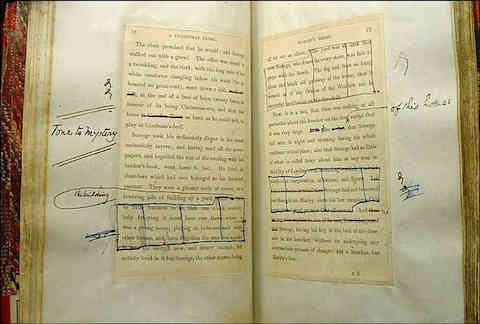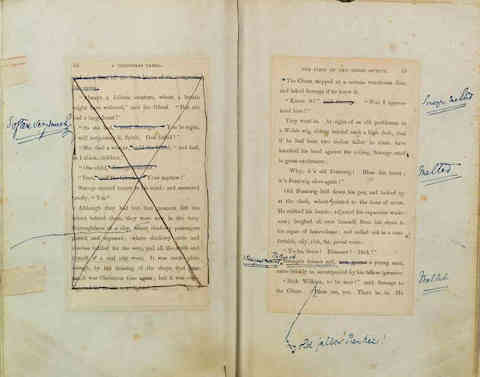Click for larger image
No holiday season can seem to provoke as much anxiety, or even outright discord, as Christmas. But there are at least a few things most everyone can agree on. I would like to think one of them is A Charlie Brown Christmas (and its soundtrack). Another, I’m sure, is Charles Dickens’ A Christmas Carol (1843). Some readers might object to the tale’s maudlin sentimentality. But few would say it isn’t a great story, and well told. And in Dickens’ day, you might be lucky enough to catch the author himself reading it aloud. According to curator Issac Gewirtz, Dickens gave somewhere around 150 readings of A Christmas Carol. This, at a time, Gewirtz tells us, when “public readings of fiction or poetry [were] not done; it was considered a desecration of one’s art and a lowering of one’s dignity.” Nevertheless, while Dickens may have let his own children down, he would not disappoint his loyal readers.
As is generally the case when a work of prose goes to the stage, the text needed pruning. NPR’s All Things Considered brings us these images of Dickens’ “promptbook” for his performances, a copy of the text greatly abridged by Dickens’ own hand and now residing at the New York Public Library. While Dickens’ first performance ran three hours, later versions took about half that time. In-between, he slashed out whole paragraphs, simplified words and phrases, and removed entire pages. “What’s interesting to see,” says Gewirtz, “is how much of the atmospherics have been deleted.” Instead, Dickens conveys the mood with marginal stage cues like “soften very much” and “tone to mystery.” It is intriguing to imagine Dickens taking on the roles of Scrooge, Marley, and Cratchet père and fils, but alas we’ll never get to hear him. We can, however, hear the voice of Dickens’ great-grandaughter, novelist Monica Dickens (below), who in 1950 recorded her version of the family Christmas fable.
Monica’s daughter Mary Danby, also a novelist, tells the BBC that her mother’s rendition is faithful to the Dickens’ family tradition of readings, begun by Charles himself. Therefore, Monica’s phrasing is as much like Charles Dickens’ as we’re likely to hear. Dickensianism is still something of a family business, as is writing. “In my family,” says Dickens’ great-great-grandaughter Mary, “they think you are a bit odd if you haven’t written a book.” Still, I doubt their Christmases are any better, or any worse, than the rest of ours.
Related Content:
A Christmas Carol Presented in a Thomas Edison Film (1910)
A Christmas Carol, A Vintage Radio Broadcast by Orson Welles and Lionel Barrymore (1939)
Celebrate the 200th Birthday of Charles Dickens with Free Movies, eBooks and Audio Books
The Historic Meeting Between Dickens and Dostoevsky Revealed as a Great Literary Hoax
Josh Jones is a writer and musician based in Durham, NC. Follow him at @jdmagness




Leave a Reply